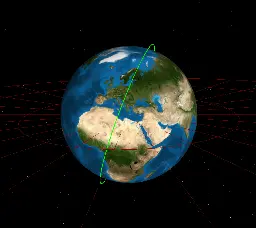All the volunteers could operate under the site license. Maybe?
The Wyse terminal is a smart design choice. These older desktop / terminal systems have plenty of power to run a specialized software package, and they tend to last way longer than the manufacturer intended.

Had the pleasure of operating some FT8 this afternoon on 15m. Made 2 contacts with Japan, running 10 watts from the Discovery TX-500 into a WRC Platinum 1000.
I was reading a post on the other site about a guy who really had a bad experience. I guess he posted asking questions about material on the test but phrased them in the first person. A number of people really lit him up. Basically accused him of being a war criminal. Needless to say we really should self police when we see stuff like that going on.
Got GD77 onto my MD-UV390. Installation was dead simple. Now building the codeplug. The codeplugs are different from the TYT CPS and the GD77 CPS.
Lab599 — Radio for adventure, extremes, for using in places unattainable before, without compromise between performance and features
Recently started looking at this radio. After Delta paid me to postpone my trip for a day, they gave me enough for this radio and then some. I stopped by HRO and bought it. I spent some time today tuning an EFHW made from a chalk line, and hopefully tomorrow I will get out to use it. Anyone used one of these before for digital, or other modes? Any M17 HF nets?
I have an FT-891 and I noticed I have to jack my mic gain way up to get any output on the radio. I am considering a Heil headset. I generally use apple ear pods to listen to the radio, so the experience might not be all that different. Anyway, I noticed there is an 2 different microphone offerings. Which one should I go with?
After the post in here about W0CHP dashboard for Pi-Star I decided to dedicate a hotspot to M17. I have it functioning, but that means now I need a radio. :) who doesn't want a good excuse to buy a radio?
There are a number of changes that could be made to the FT8 protocol to make it faster and more resilient to low signal strength. Some of these changes include:
-
Increase the bandwidth: Increasing the bandwidth would allow more data to be transmitted per symbol, which would improve the speed of the protocol. However, this would also make the protocol more susceptible to interference.
-
Use a different error correction scheme: The current error correction scheme in FT8 is relatively simple, and it can be difficult to correct errors when the signal is weak. Using a more sophisticated error correction scheme would improve the resilience of the protocol to low signal strength.
-
Change the modulation scheme: The current modulation scheme in FT8 is based on frequency shift keying (FSK). Changing the modulation scheme to something like quadrature amplitude modulation (QAM) would improve the spectral efficiency of the protocol, which would allow more data to be transmitted over a given bandwidth.
-
Use a different symbol rate: The current symbol rate in FT8 is 31.25 baud. Using a lower symbol rate would improve the resilience of the protocol to low signal strength, but it would also reduce the speed of the protocol. These are just a few of the changes that could be made to the FT8 protocol to make it faster and more resilient to low signal strength. The best changes to make would depend on the specific requirements of the application.
In addition to the changes mentioned above, there are a number of other things that could be done to improve the performance of FT8 in low-signal conditions. These include:
-
Using a better antenna: A better antenna will improve the reception of weak signals.
-
Using a higher output power: A higher output power will increase the strength of the transmitted signal, which will make it more likely to be received by the other station.
-
Using a noise-cancelling filter: A noise-cancelling filter can help to reduce the noise in the received signal, which will make it easier to decode the signal.
By making these changes, it is possible to improve the performance of FT8 in low-signal conditions and make it possible to communicate over longer distances even with weak signals.
The Fly Your Satellite! (FYS) programme, initiated by the European Space Agency (ESA), presents an exciting challenge for radio amateurs and space enthusiasts worldwide to establish communication via the LEDSAT CubeSat digipeater. This unique opportunity invites participants to connect with the ESA ...

This looks fun, I might give it a go.
Contribute to nostar/DroidStar development by creating an account on GitHub.

I found this software when trying to get into M17. There are other versions like DudeStar but this one worked best on my system (Debian Linux). Anyone used M17 Yet?
I use mine as an I-Gate with the default firmware installed on it. Has anyone looked into building open source firmware for these? The reason I ask, it seems as the device does not really transmit any packets. This could be a setting or a filter I have wrong. so maybe someone has some insight.
I saw this on the Mastodon.Radio feed, now I want one.
It wasn't the longest contact ever but I did manage Washington state from San Diego last weekend. running 2 watts into a WRC antenna from the QRP-Labs QDX.
